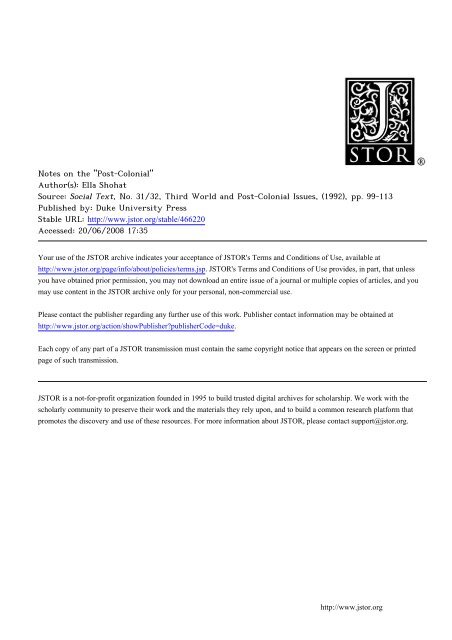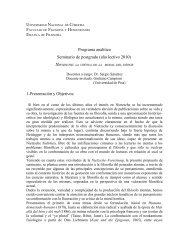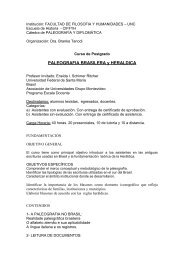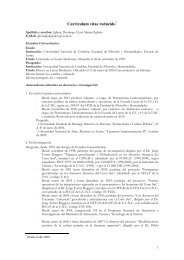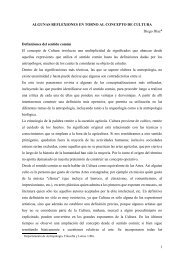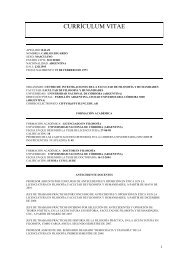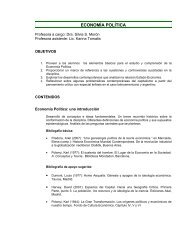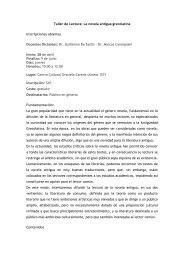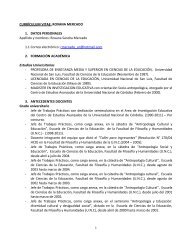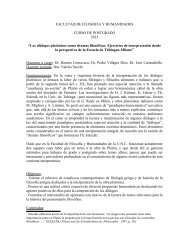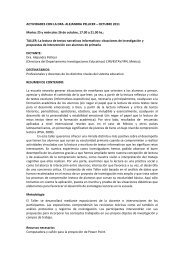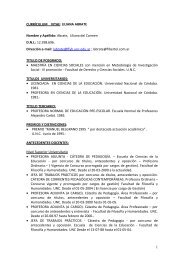Notes on the "Post-Colonial" Author(s): Ella Shohat Source: Social ...
Notes on the "Post-Colonial" Author(s): Ella Shohat Source: Social ...
Notes on the "Post-Colonial" Author(s): Ella Shohat Source: Social ...
You also want an ePaper? Increase the reach of your titles
YUMPU automatically turns print PDFs into web optimized ePapers that Google loves.
<str<strong>on</strong>g>Notes</str<strong>on</strong>g> <strong>on</strong> <strong>the</strong> "<strong>Post</strong>-Col<strong>on</strong>ial"<strong>Author</strong>(s): <strong>Ella</strong> <strong>Shohat</strong><strong>Source</strong>: <strong>Social</strong> Text, No. 31/32, Third World and <strong>Post</strong>-Col<strong>on</strong>ial Issues, (1992), pp. 99-113Published by: Duke University PressStable URL: http://www.jstor.org/stable/466220Accessed: 20/06/2008 17:35Your use of <strong>the</strong> JSTOR archive indicates your acceptance of JSTOR's Terms and C<strong>on</strong>diti<strong>on</strong>s of Use, available athttp://www.jstor.org/page/info/about/policies/terms.jsp. JSTOR's Terms and C<strong>on</strong>diti<strong>on</strong>s of Use provides, in part, that unlessyou have obtained prior permissi<strong>on</strong>, you may not download an entire issue of a journal or multiple copies of articles, and youmay use c<strong>on</strong>tent in <strong>the</strong> JSTOR archive <strong>on</strong>ly for your pers<strong>on</strong>al, n<strong>on</strong>-commercial use.Please c<strong>on</strong>tact <strong>the</strong> publisher regarding any fur<strong>the</strong>r use of this work. Publisher c<strong>on</strong>tact informati<strong>on</strong> may be obtained athttp://www.jstor.org/acti<strong>on</strong>/showPublisher?publisherCode=duke.Each copy of any part of a JSTOR transmissi<strong>on</strong> must c<strong>on</strong>tain <strong>the</strong> same copyright notice that appears <strong>on</strong> <strong>the</strong> screen or printedpage of such transmissi<strong>on</strong>.JSTOR is a not-for-profit organizati<strong>on</strong> founded in 1995 to build trusted digital archives for scholarship. We work with <strong>the</strong>scholarly community to preserve <strong>the</strong>ir work and <strong>the</strong> materials <strong>the</strong>y rely up<strong>on</strong>, and to build a comm<strong>on</strong> research platform thatpromotes <strong>the</strong> discovery and use of <strong>the</strong>se resources. For more informati<strong>on</strong> about JSTOR, please c<strong>on</strong>tact support@jstor.org.http://www.jstor.org
<str<strong>on</strong>g>Notes</str<strong>on</strong>g> <strong>on</strong> <strong>the</strong> "<strong>Post</strong>-Col<strong>on</strong>ial"ELLA SHOHATThe academic oppositi<strong>on</strong> to <strong>the</strong> Gulf War mobilized a number of familiarterms - "imperialism," "neo-col<strong>on</strong>ialism," "neo-imperialism "- in averbal counter-strike against <strong>the</strong> New World Order. But c<strong>on</strong>spicuouslyabsent from <strong>the</strong> discussi<strong>on</strong> was <strong>the</strong> term "post-col<strong>on</strong>ial," even fromspeeches made by its o<strong>the</strong>rwise prominent advocates. Given <strong>the</strong> extraordinarycirculati<strong>on</strong> of <strong>the</strong> term in recent academic c<strong>on</strong>ferences, publicati<strong>on</strong>sand curricular reformulati<strong>on</strong>s, this sudden invisibility wassomewhat puzzling. Was this absence sheer coincidence? Or is <strong>the</strong>resomething about <strong>the</strong> term "post-col<strong>on</strong>ial" that does not lend itself to ageopolitical critique, or to a critique of <strong>the</strong> dominant media's Gulf Warmacro-narratives? When lines drawn in <strong>the</strong> sand still haunt Third Worldgeographies, it is urgent to ask how we can chart <strong>the</strong> meaning of <strong>the</strong>"post-col<strong>on</strong>ial." It is from my particular positi<strong>on</strong> as an academic Arab-Jew whose cultural topographies are (dis)located in Iraq, Israel/Palestine,and <strong>the</strong> U.S.A. that I would like to explore some of <strong>the</strong> <strong>the</strong>oretical andpolitical ambiguities of <strong>the</strong> "post-col<strong>on</strong>ial."Despite its dizzying multiplicity of positi<strong>on</strong>alities, post-col<strong>on</strong>ial <strong>the</strong>oryhas curiously not addressed <strong>the</strong> politics of locati<strong>on</strong> of <strong>the</strong> very term"post-col<strong>on</strong>ial." In what follows, I propose to begin an interrogati<strong>on</strong> of<strong>the</strong> term "post-col<strong>on</strong>ial," raising questi<strong>on</strong>s about its ahistorical and universalizingdeployments, and its potentially depoliticizing implicati<strong>on</strong>s.The rising instituti<strong>on</strong>al endorsement of <strong>the</strong> term "post-col<strong>on</strong>ial" and ofpost-col<strong>on</strong>ial studies as an emergent discipline (evident in MLA jobannouncements calling for specializati<strong>on</strong> in "post-col<strong>on</strong>ial literature") isfraught with ambiguities. My recent experience as a member of <strong>the</strong>multicultural internati<strong>on</strong>al studies committee at <strong>on</strong>e of <strong>the</strong> CUNYbranches illustrates some of <strong>the</strong>se ambiguities. In resp<strong>on</strong>se to our proposal,<strong>the</strong> generally c<strong>on</strong>servative members of <strong>the</strong> college curriculumcommittee str<strong>on</strong>gly resisted any language invoking issues such as "imperialismand third worldist critique," "neo-col<strong>on</strong>ialism and resisting culturalpractices," and "<strong>the</strong> geopolitics of cultural exchange." They werevisibly relieved, however, at <strong>the</strong> sight of <strong>the</strong> word "post-col<strong>on</strong>ial." Only<strong>the</strong> diplomatic gesture of relinquishing <strong>the</strong> terrorizing terms "imperialism"and "neo-col<strong>on</strong>ialism" in favor of <strong>the</strong> pastoral "post-col<strong>on</strong>ial" guaranteedapproval.99
<str<strong>on</strong>g>Notes</str<strong>on</strong>g> <strong>on</strong> <strong>the</strong> "<strong>Post</strong>-Col<strong>on</strong>ial"My intenti<strong>on</strong> here is not merely to anatomize <strong>the</strong> term "post-col<strong>on</strong>ial"semantically, but to situate it geographically, historically and instituti<strong>on</strong>ally,while raising doubts about its political agency. The questi<strong>on</strong> at stakeis this. Which perspectives are being advanced in <strong>the</strong> "post-col<strong>on</strong>ial?" Forwhat purposes? And with what slippages? In this brief discussi<strong>on</strong>, mypoint is nei<strong>the</strong>r to examine <strong>the</strong> variety of provocative writings producedunder <strong>the</strong> rubric post-col<strong>on</strong>ial <strong>the</strong>ory, nor simply to essentialize <strong>the</strong> term"post-col<strong>on</strong>ial," but ra<strong>the</strong>r to unfold its slippery political significati<strong>on</strong>s,which occasi<strong>on</strong>ally escape <strong>the</strong> clearly oppositi<strong>on</strong>al intenti<strong>on</strong>s of its <strong>the</strong>oreticalpractiti<strong>on</strong>ers. Here I will argue for a more limited, historically and<strong>the</strong>oretically specific, usage of <strong>the</strong> term "post-col<strong>on</strong>ial," <strong>on</strong>e which situatesit in a relati<strong>on</strong>al c<strong>on</strong>text vis-a-vis o<strong>the</strong>r (equally problematic) categories.The "post-col<strong>on</strong>ial" did not emerge to fill an empty space in <strong>the</strong>language of political-cultural analysis. On <strong>the</strong> c<strong>on</strong>trary, its wide adaptati<strong>on</strong>during <strong>the</strong> late eighties was coincident with and dependent <strong>on</strong> <strong>the</strong>eclipse of an older paradigm, that of <strong>the</strong> "Third World." The terminologicalshift indicates <strong>the</strong> professi<strong>on</strong>al prestige and <strong>the</strong>oretical aura <strong>the</strong>issues have acquired, in c<strong>on</strong>trast to <strong>the</strong> more activist aura <strong>on</strong>ce enjoyedby "Third World" within progressive academic circles. Coined in <strong>the</strong>fifties in France by analogy to <strong>the</strong> third estate (<strong>the</strong> comm<strong>on</strong>ers, all thosewho were nei<strong>the</strong>r <strong>the</strong> nobility nor <strong>the</strong> clergy), <strong>the</strong> term "Third World"gained internati<strong>on</strong>al currency in both academic and political c<strong>on</strong>texts,particularly in reference to anti-col<strong>on</strong>ial nati<strong>on</strong>alist movements of <strong>the</strong>fifties through <strong>the</strong> seventies as well as to <strong>the</strong> political-ec<strong>on</strong>omic analysisof dependency <strong>the</strong>ory and world system <strong>the</strong>ory (Andrd Gunder Frank,Immanuel Wallerstein, Samir Amin).The last decade has witnessed a terminological crisis around <strong>the</strong> c<strong>on</strong>ceptof <strong>the</strong> "Third World." The three worlds <strong>the</strong>ory is indeed, as manycritics have suggested, highly problematic.' For <strong>on</strong>e thing, <strong>the</strong> historicalprocesses of <strong>the</strong> last three decades offered a number of very complex andpolitically ambiguous developments. The period of so-called "ThirdWorld euphoria" - a brief moment in which it seemed that First Worldleftists and Third World guerrillas would walk arm in arm toward globalrevoluti<strong>on</strong> - has given way to <strong>the</strong> collapse of <strong>the</strong> Soviet Communistmodel, <strong>the</strong> crisis of existing socialisms, <strong>the</strong> frustrati<strong>on</strong> of <strong>the</strong> hoped-fortric<strong>on</strong>tinental revoluti<strong>on</strong> (with Ho Chi Minh, Frantz Fan<strong>on</strong>, and CheGuevara as talismanic figures), <strong>the</strong> realizati<strong>on</strong> that <strong>the</strong> wretched of <strong>the</strong>earth are not unanimously revoluti<strong>on</strong>ary (nor necessarily allies to <strong>on</strong>eano<strong>the</strong>r), and <strong>the</strong> recogniti<strong>on</strong> that internati<strong>on</strong>al geo-politics and <strong>the</strong> globalec<strong>on</strong>omic system have obliged even socialist regimes to make some kindof peace with transnati<strong>on</strong>al capitalism. And despite <strong>the</strong> broad patterns ofgeo-political hegem<strong>on</strong>y, power relati<strong>on</strong>s in <strong>the</strong> Third World are alsodispersed and c<strong>on</strong>tradictory. The First World/Third World struggle, fur-
<strong>Ella</strong> <strong>Shohat</strong> 101<strong>the</strong>rmore, takes place not <strong>on</strong>ly between nati<strong>on</strong>s (India/Pakistan, Iraq/Kuwait),but also within nati<strong>on</strong>s, with <strong>the</strong> c<strong>on</strong>stantly changing relati<strong>on</strong>sbetween dominant and subaltern groups, settler and indigenous populati<strong>on</strong>s,as well as in a situati<strong>on</strong> marked by waves of post-independenceimmigrati<strong>on</strong>s to First World countries (Britain, France, Germany, and <strong>the</strong>U.S.) and to more prosperous Third World countries (<strong>the</strong> Gulf states.) Thenoti<strong>on</strong> of <strong>the</strong> three worlds, in short, flattens heterogeneities, masks c<strong>on</strong>tradicti<strong>on</strong>s,and elides differences.This crisis in "Third World" thinking helps explain <strong>the</strong> current enthusiasmfor <strong>the</strong> term, "post-col<strong>on</strong>ial," a new designati<strong>on</strong> for critical discourseswhich <strong>the</strong>matize issues emerging from col<strong>on</strong>ial relati<strong>on</strong>s and <strong>the</strong>iraftermath, covering a l<strong>on</strong>g historical span (including <strong>the</strong> present.) Dropping<strong>the</strong> suffix"ism" from "post-col<strong>on</strong>ialism," <strong>the</strong> adjective "post-col<strong>on</strong>ial"is frequently attached to <strong>the</strong> nouns, "<strong>the</strong>ory," "space," "c<strong>on</strong>diti<strong>on</strong>,""intellectual," while it often substitutes for <strong>the</strong> adjective "Third World"in relati<strong>on</strong> to <strong>the</strong> noun "intellectual." The qualifier "Third World," byc<strong>on</strong>trast, more frequently accompanies <strong>the</strong> nouns, "nati<strong>on</strong>s," "countries"and "peoples." More recently <strong>the</strong> "post-col<strong>on</strong>ial" has been transformedinto a noun, used both in <strong>the</strong> singular and <strong>the</strong> plural ("postcol<strong>on</strong>ials"),designating <strong>the</strong> subjects of <strong>the</strong> "postcol<strong>on</strong>ial c<strong>on</strong>diti<strong>on</strong>."2 The final c<strong>on</strong>secrati<strong>on</strong>of <strong>the</strong> term came with <strong>the</strong> erasure of <strong>the</strong> hyphen. Often buttressedby <strong>the</strong> <strong>the</strong>oretically c<strong>on</strong>noted substantive "post-col<strong>on</strong>iality," <strong>the</strong>"post-col<strong>on</strong>ial" is largely visible in Anglo-American academic (cultural)studies in publicati<strong>on</strong>s of discursive-cultural analyses inflected by poststructuralism.3Echoing "post-modernity," "postcol<strong>on</strong>iality" marks a c<strong>on</strong>temporarystate, situati<strong>on</strong>, c<strong>on</strong>diti<strong>on</strong> or epoch.4 The prefix "post," <strong>the</strong>n, aligns "postcol<strong>on</strong>ialism"with a series of o<strong>the</strong>r "posts" - "post-structuralism," "postmodernism,""post-marxism," "post-feminism," "post-dec<strong>on</strong>structi<strong>on</strong>ism"- all sharing <strong>the</strong> noti<strong>on</strong> of a movement bey<strong>on</strong>d. Yet while <strong>the</strong>se "posts"refer largely to <strong>the</strong> supercessi<strong>on</strong> of outmoded philosophical, aes<strong>the</strong>tic andpolitical <strong>the</strong>ories, <strong>the</strong> "post-col<strong>on</strong>ial" implies both going bey<strong>on</strong>d anti-col<strong>on</strong>ialnati<strong>on</strong>alist <strong>the</strong>ory as well as a movement bey<strong>on</strong>d a specific point inhistory, that of col<strong>on</strong>ialism and Third World nati<strong>on</strong>alist struggles. In thatsense <strong>the</strong> prefix "post" aligns <strong>the</strong> "post-col<strong>on</strong>ial" with ano<strong>the</strong>r genre of"posts" - "post-war," "post-cold war," "post-independence," "post-revoluti<strong>on</strong>"-all of which underline a passage into a new period and aclosure of a certain historical event or age, officially stamped with dates.Although periodizati<strong>on</strong>s and <strong>the</strong> relati<strong>on</strong>ship between <strong>the</strong>ories of an eraand <strong>the</strong> practices which c<strong>on</strong>stitute that era always form c<strong>on</strong>tested terrains,it seems to me that <strong>the</strong> two genres of <strong>the</strong> "post" are n<strong>on</strong>e<strong>the</strong>less distinctin <strong>the</strong>ir referential emphasis, <strong>the</strong> first <strong>on</strong> disciplinary advances characteristicof intellectual history, and <strong>the</strong> latter <strong>on</strong> <strong>the</strong> strict chr<strong>on</strong>ologies ofhistory tout court. This unarticulated tensi<strong>on</strong> between <strong>the</strong> philosophical
102<str<strong>on</strong>g>Notes</str<strong>on</strong>g> <strong>on</strong> <strong>the</strong> "<strong>Post</strong>-Col<strong>on</strong>ial"and <strong>the</strong> historical teleologies in <strong>the</strong> "post-col<strong>on</strong>ial," I would argue, partiallyunderlies some of <strong>the</strong> c<strong>on</strong>ceptual ambiguities of <strong>the</strong> term.Since <strong>the</strong> "post" in <strong>the</strong> "post-col<strong>on</strong>ial" suggests "after" <strong>the</strong> demise ofcol<strong>on</strong>ialism, it is imbued, quite apart from its users' intenti<strong>on</strong>s, with anambiguous spatio-temporality. Spreading from India into Anglo-Americanacademic c<strong>on</strong>texts, <strong>the</strong> "post-col<strong>on</strong>ial" tends to be associated withThird World countries which gained independence after World War II.However, it also refers to <strong>the</strong> Third World diasporic circumstances of <strong>the</strong>last four decades - from forced exile to "voluntary" immigrati<strong>on</strong> -within First World metropolises. In some post-col<strong>on</strong>ial texts, such as TheEmpire Writes Back: Theory and Practice in <strong>Post</strong>-Col<strong>on</strong>ial Literatures,<strong>the</strong> authors expand <strong>the</strong> term "post-col<strong>on</strong>ial" to include all English literaryproducti<strong>on</strong>s by societies affected by col<strong>on</strong>ialism:...<strong>the</strong> literatures of African countries, Australia, Bangladesh, Canada,Caribbean countries, India, Malasia, Malta, New Zealand, Pakistan,Singapore, South Pacific Island countries, and Sri Lanka are all postcol<strong>on</strong>ialliteratures. The literature of <strong>the</strong> USA should also be placed inthis category. Perhaps because of its current positi<strong>on</strong> of power, and <strong>the</strong>neo-col<strong>on</strong>izing role it has played, its postcol<strong>on</strong>ial nature has not beengenerally recognized. But its relati<strong>on</strong>ship with <strong>the</strong> metropolitan centreas it evolved over <strong>the</strong> last two centuries has been paradigmatic forpost-col<strong>on</strong>ial literature everywhere. What each of <strong>the</strong>se literatures hasin comm<strong>on</strong> bey<strong>on</strong>d <strong>the</strong>ir special and distinctive regi<strong>on</strong>al characteristicsis that <strong>the</strong>y emerged in <strong>the</strong>ir present form out of <strong>the</strong> experience ofcol<strong>on</strong>izati<strong>on</strong> and asserted <strong>the</strong>mselves by foregrounding <strong>the</strong> tensi<strong>on</strong>with <strong>the</strong> imperial power, and by emphasizing <strong>the</strong>ir differences from<strong>the</strong> assumpti<strong>on</strong>s of <strong>the</strong> imperial centre. It is this which makes <strong>the</strong>mdistinctively post-col<strong>on</strong>ial.This problematic formulati<strong>on</strong> collapses very different nati<strong>on</strong>al-racialformati<strong>on</strong>s - <strong>the</strong> United States, Australia, and Canada, <strong>on</strong> <strong>the</strong> <strong>on</strong>e hand,and Nigeria, Jamaica, and India, <strong>on</strong> <strong>the</strong> o<strong>the</strong>r -as equally "post-col<strong>on</strong>ial."Positi<strong>on</strong>ing Australia and India, for example, in relati<strong>on</strong> to animperial center, simply because <strong>the</strong>y were both col<strong>on</strong>ies, equates <strong>the</strong>relati<strong>on</strong>s of <strong>the</strong> col<strong>on</strong>ized white-settlers to <strong>the</strong> Europeans at <strong>the</strong> "center"with that of <strong>the</strong> col<strong>on</strong>ized indigenous populati<strong>on</strong>s to <strong>the</strong> Europeans. It alsoassumes that white settler countries and emerging Third World nati<strong>on</strong>sbroke away from <strong>the</strong> "center" in <strong>the</strong> same way. Similarly, white Australiansand Aboriginal Australians are placed in <strong>the</strong> same "periphery," asthough <strong>the</strong>y were co-habitatants vis-a-vis <strong>the</strong> "center." The critical differencesbetween <strong>the</strong> Europe's genocidal oppressi<strong>on</strong> of Aboriginals in Australia,indigenous peoples of <strong>the</strong> Americas and Afro-diasporiccommunities, and Europe's dominati<strong>on</strong> of European elites in <strong>the</strong> col<strong>on</strong>iesare leveled with an easy stroke of <strong>the</strong> "post." The term "post-col<strong>on</strong>ial," inthis sense, masks <strong>the</strong> white settlers' col<strong>on</strong>ialist-racist policies towardindigenous peoples not <strong>on</strong>ly before independence but also after <strong>the</strong> offi-
<strong>Ella</strong> <strong>Shohat</strong>103cial break from <strong>the</strong> imperial center, while also de-emphasizing neocol<strong>on</strong>ialglobal positi<strong>on</strong>ings of First World settler-states.I am not suggesting that this expanded use of <strong>the</strong> "post-col<strong>on</strong>ial" istypical or paradigmatic.6 The phrase "post-col<strong>on</strong>ial society" mightequally evoke Third World nati<strong>on</strong>-states after independence. However,<strong>the</strong> disorienting space of <strong>the</strong> "post-col<strong>on</strong>ial" generates odd couplings of<strong>the</strong> "post" and particular geographies, blurring <strong>the</strong> assignment of perspectives.Does <strong>the</strong> "post" indicate <strong>the</strong> perspective and locati<strong>on</strong> of <strong>the</strong> ex-col<strong>on</strong>ized(Algerian), <strong>the</strong> ex-col<strong>on</strong>izer (French), <strong>the</strong> ex-col<strong>on</strong>ial-settler (PiedNoir), or <strong>the</strong> displaced hybrid in First World metropolitans (Algerian inFrance)? Since <strong>the</strong> experience of col<strong>on</strong>ialism and imperialism is shared,albeit asymmetrically, by (ex)col<strong>on</strong>izer and (ex)col<strong>on</strong>ized, it becomes aneasy move to apply <strong>the</strong> "post" also to First World European countries.Since most of <strong>the</strong> world is now living after <strong>the</strong> period of col<strong>on</strong>ialism, <strong>the</strong>"post-col<strong>on</strong>ial" can easily become a universalizing category which neutralizessignificant geopolitical differences between France and Algeria,Britain and Iraq, or <strong>the</strong> U.S. and Brazil since <strong>the</strong>y are all living in a"post-col<strong>on</strong>ial epoch." This inadvertent effacement of perspectives, Ishould add, results in a curious ambiguity in scholarly work. Whilecol<strong>on</strong>ial discourse refers to <strong>the</strong> discourse produced by col<strong>on</strong>izers in both<strong>the</strong> col<strong>on</strong>y and <strong>the</strong> mo<strong>the</strong>rland and, at times, to its c<strong>on</strong>temporary discursivemanifestati<strong>on</strong>s in literature and mass-mediated culture, "post-col<strong>on</strong>ialdiscourse" does not refer to col<strong>on</strong>ialist discourse after <strong>the</strong> end ofcol<strong>on</strong>ialism. Ra<strong>the</strong>r, it evokes <strong>the</strong> c<strong>on</strong>temporary <strong>the</strong>oretical writings,placed in both <strong>the</strong> First and Third Worlds generally <strong>on</strong> <strong>the</strong> left, and whichattempt to transcend <strong>the</strong> (presumed) binarisms of Third Worldist militancy.Apart from its dubious spatiality, <strong>the</strong> "post-col<strong>on</strong>ial" renders a problematictemporality. First, <strong>the</strong> lack of historical specificity in <strong>the</strong> "post"leads to a collapsing of diverse chr<strong>on</strong>ologies. Col<strong>on</strong>ial-settler states, suchas those found in <strong>the</strong> Americas, Australia, New Zealand, and South Africa,gained <strong>the</strong>ir independence, for <strong>the</strong> most part, in <strong>the</strong> eighteenth and nineteenthcenturies. Most countries in Africa and Asia, in c<strong>on</strong>trast, gainedindependence in <strong>the</strong> twentieth century, some in <strong>the</strong> nineteen thirties(Iraq), o<strong>the</strong>rs in <strong>the</strong> nineteen forties (India, Leban<strong>on</strong>), and still o<strong>the</strong>rs in<strong>the</strong> nineteen sixties (Algeria, Senegal) and <strong>the</strong> nineteen seventies (Angola,Mozambique), while o<strong>the</strong>rs have yet to achieve it. When exactly,<strong>the</strong>n, does <strong>the</strong> "post-col<strong>on</strong>ial" begin? Which regi<strong>on</strong> is privileged in sucha beginning? What are <strong>the</strong> relati<strong>on</strong>ships between <strong>the</strong>se diverse beginnings?The vague starting point of <strong>the</strong> "post-col<strong>on</strong>ial" makes certaindifferentiati<strong>on</strong>s difficult. It equates early independence w<strong>on</strong> by settler-col<strong>on</strong>ialstates, in which Europeans formed <strong>the</strong>ir new nati<strong>on</strong>-states in n<strong>on</strong>-European territories at <strong>the</strong> expense of indigenous populati<strong>on</strong>s, with thatof nati<strong>on</strong>-states whose indigenous populati<strong>on</strong>s struggled for indepen-
104<str<strong>on</strong>g>Notes</str<strong>on</strong>g> <strong>on</strong> <strong>the</strong> "<strong>Post</strong>-Col<strong>on</strong>ial"dence against Europe, but w<strong>on</strong> it, for <strong>the</strong> most part, with <strong>the</strong> twentiethcentury collapse of European Empires.If <strong>on</strong>e formulates <strong>the</strong> "post" in <strong>the</strong> "post-col<strong>on</strong>ial" in relati<strong>on</strong> to ThirdWorldist nati<strong>on</strong>alist struggles of <strong>the</strong> fifties and sixties, <strong>the</strong>n what timeframe would apply for c<strong>on</strong>temporary anti-col<strong>on</strong>ial/anti-racist strugglescarried under <strong>the</strong> banner of nati<strong>on</strong>al and racial oppressi<strong>on</strong>, for Palestinianwriters for example, like Sahar Khalifeh and Mahmoud Darwish, whowrite c<strong>on</strong>temporaneously with "post-col<strong>on</strong>ial" writers? Should <strong>on</strong>e suggestthat <strong>the</strong>y are pre-"postcol<strong>on</strong>ial?" The unified temporality of"postcol<strong>on</strong>iality" risks reproducing <strong>the</strong> col<strong>on</strong>ial discourse of an allochr<strong>on</strong>ico<strong>the</strong>r, living in ano<strong>the</strong>r time, still lagging behind us, <strong>the</strong> genuinepostcol<strong>on</strong>ials. The globalizing gesture of <strong>the</strong> "postcol<strong>on</strong>ial c<strong>on</strong>diti<strong>on</strong>," or"post-col<strong>on</strong>iality," downplays multiplicities of locati<strong>on</strong> and temporality,as well as <strong>the</strong> possible discursive and political linkages betweeen "postcol<strong>on</strong>ial"<strong>the</strong>ories and c<strong>on</strong>temporary anti-col<strong>on</strong>ial, or anti-neo-col<strong>on</strong>ialstruggles and discourses. In o<strong>the</strong>r words, c<strong>on</strong>temporary anti-col<strong>on</strong>ial andanti-neocol<strong>on</strong>ial resistant discourses from central America and <strong>the</strong> MiddleEast to Sou<strong>the</strong>rn Africa and <strong>the</strong> Phillipines cannot be <strong>the</strong>oretically dismissedas epig<strong>on</strong>s, as a mere repetiti<strong>on</strong> of <strong>the</strong> all too familiar discoursesof <strong>the</strong> fifties and sixties. Despite <strong>the</strong>ir partly shared discourses with ThirdWorld nati<strong>on</strong>alism, <strong>the</strong>se c<strong>on</strong>temporary struggles also must be historicized,analyzed in a present-day c<strong>on</strong>text, when <strong>the</strong> "n<strong>on</strong>-aligned" discourseof revoluti<strong>on</strong>s is no l<strong>on</strong>ger in <strong>the</strong> air. Such an approach wouldtranscend <strong>the</strong> implicit suggesti<strong>on</strong> of a temporal "gap" between "post-col<strong>on</strong>ial"and <strong>the</strong> pre-"postcol<strong>on</strong>ial" discourses, as exemplified in <strong>the</strong> melangeof resistant discourses and struggles in <strong>the</strong> Intifada.7 What has to benegotiated, <strong>the</strong>n, is <strong>the</strong> relati<strong>on</strong>ship of difference and sameness, ruptureand c<strong>on</strong>tinuity.Since, <strong>on</strong> <strong>on</strong>e level, <strong>the</strong> "post" signifies "after," it potentially inhibitsforceful articulati<strong>on</strong>s of what <strong>on</strong>e might call "neo-col<strong>on</strong>iality." Formalindependence for col<strong>on</strong>ized countries has rarely meant <strong>the</strong> end of FirstWorld hegem<strong>on</strong>y. Egypt's formal independence in 1923 did not preventEuropean, especially British, dominati<strong>on</strong> which provoked <strong>the</strong> 1952 revoluti<strong>on</strong>.Anwar Sadat's opening to <strong>the</strong> Americans and <strong>the</strong> Camp Davidaccords in <strong>the</strong> seventies were perceived by Arab intellectuals as a reversi<strong>on</strong>to pre-Nasser imperialism, as was Egyptian collaborati<strong>on</strong> with <strong>the</strong>U.S. during <strong>the</strong> Gulf war.8 The purpose of <strong>the</strong> Carter Doctrine was topartially protect perennial U.S. oil interests (our oil) in <strong>the</strong> Gulf, which,with <strong>the</strong> help of petro-Islamicist regimes, have sought <strong>the</strong> c<strong>on</strong>trol of anyforce that might pose a threat.9 In Latin America, similarly, formal "creole"independence did not prevent M<strong>on</strong>roe Doctrine-style military interventi<strong>on</strong>s,or Anglo-American free-trade hegem<strong>on</strong>y. This process sets <strong>the</strong>history of Central and South America and <strong>the</strong> Caribbean apart from <strong>the</strong>rest of <strong>the</strong> col<strong>on</strong>ial settler-states; for despite shared historical origins with
<strong>Ella</strong> <strong>Shohat</strong>105North America, including <strong>the</strong> genocide of <strong>the</strong> indigenous populati<strong>on</strong>, <strong>the</strong>enslavement of Africans, and a multi-racial/ethnic compositi<strong>on</strong> <strong>the</strong>seregi<strong>on</strong>s have been subjected to political and ec<strong>on</strong>omic structural dominati<strong>on</strong>,<strong>on</strong> some levels more severe, paradoxically, than that of recentlyindependent Third World countries such as Libya and even India. Notaccidentally, Mexican intellectuals and independent labor uni<strong>on</strong>s haveexcoriated <strong>the</strong> Gringostroika O1 of <strong>the</strong> recent Trade Liberalizati<strong>on</strong> Treaty.Formal independence did not obviate <strong>the</strong> need for Cuban or Nicaraguanstylerevoluti<strong>on</strong>s, or for <strong>the</strong> Independista movement in Puerto Rico. Theterm "revoluti<strong>on</strong>," <strong>on</strong>ce popular in <strong>the</strong> Third World c<strong>on</strong>text, specificallyassumed a post-col<strong>on</strong>ial moment, initiated by official independence, butwhose c<strong>on</strong>tent had been a suffocating neo-col<strong>on</strong>ial hegem<strong>on</strong>y.The term "post-col<strong>on</strong>ial" carries with it <strong>the</strong> implicati<strong>on</strong> that col<strong>on</strong>ialismis now a matter of <strong>the</strong> past, undermining col<strong>on</strong>ialism's ec<strong>on</strong>omic,political, and cultural deformative-traces in <strong>the</strong> present. The "post-col<strong>on</strong>ial"inadvertently glosses over <strong>the</strong> fact that global hegem<strong>on</strong>y, even in <strong>the</strong>post-cold war era, persists in forms o<strong>the</strong>r than overt col<strong>on</strong>ial rule. As asignifier of a new historical epoch, <strong>the</strong> term "post-col<strong>on</strong>ial," when comparedwith neo-col<strong>on</strong>ialism, comes equipped with little evocati<strong>on</strong> of c<strong>on</strong>temporarypower relati<strong>on</strong>s; it lacks a political c<strong>on</strong>tent which can accountfor <strong>the</strong> eighties and nineties-style U.S. militaristic involvements in Granada,Panama, and Kuwait-Iraq, and for <strong>the</strong> symbiotic links between U.S.political and ec<strong>on</strong>omic interests and those of local elites. In certainc<strong>on</strong>texts, fur<strong>the</strong>rmore, racial and nati<strong>on</strong>al oppressi<strong>on</strong>s reflect clear col<strong>on</strong>ialpatterns, for example <strong>the</strong> oppressi<strong>on</strong> of blacks by Anglo-Dutch Europeansin South Africa and in <strong>the</strong> Americas, <strong>the</strong> oppressi<strong>on</strong> of Palestiniansand Middle Eastern Jews by Euro-Israel. The "post-col<strong>on</strong>ial" leaves nospace, finally, for <strong>the</strong> struggles of aboriginals in Australia and indigenouspeoples throughout <strong>the</strong> Americas, in o<strong>the</strong>r words, of Fourth World peoplesdominated by both First World multi-nati<strong>on</strong>al corporati<strong>on</strong>s and by ThirdWorld nati<strong>on</strong>-states.The hegem<strong>on</strong>ic structures and c<strong>on</strong>ceptual frameworks generated over<strong>the</strong> last five hundred years cannot be vanquished by waving <strong>the</strong> magicalwand of <strong>the</strong> "post-col<strong>on</strong>ial." The 1992 unificati<strong>on</strong> of Europe, for example,streng<strong>the</strong>ns cooperati<strong>on</strong> am<strong>on</strong>g ex-col<strong>on</strong>izing countries such as Britain,France, Germany and Italy against illegal immigrati<strong>on</strong>, practicing stricterborder patrol against infiltrati<strong>on</strong> by diverse Third World peoples: Algerians,Tunisians, Egyptians, Pakistanis, Sri Lankans, Indians, Turks,Senegalese, Malians, and Nigerians. The col<strong>on</strong>ial master narrative, meanwhile,is being triumphantly re-staged. Milli<strong>on</strong>s of dollars are poured intointernati<strong>on</strong>al events planned for <strong>the</strong> quincentenary of Columbus's socalledvoyages of discovery, climaxing in <strong>the</strong> Grand Regatta, a fleet of tallships from 40 countries leaving from Spain and arriving in New YorkHarbor for U.S. Independence Day, <strong>the</strong> Fourth of July. At <strong>the</strong> same time,
106<str<strong>on</strong>g>Notes</str<strong>on</strong>g> <strong>on</strong> <strong>the</strong> "<strong>Post</strong>-Col<strong>on</strong>ial"an anti-col<strong>on</strong>ial narrative is being performed via <strong>the</strong> view-from-<strong>the</strong>-shoreprojects, <strong>the</strong> Native American commemorati<strong>on</strong>s of annihilated communitiesthroughout <strong>the</strong> U.S. and <strong>the</strong> American c<strong>on</strong>tinent, and plans for settingup blockades at <strong>the</strong> arrival of <strong>the</strong> replicas of Columbus's caravels, sailinginto U.S. ports. What, <strong>the</strong>n, is <strong>the</strong> meaning of "postcol<strong>on</strong>iality" whencertain structural c<strong>on</strong>flicts persist? Despite different historical c<strong>on</strong>texts,<strong>the</strong> c<strong>on</strong>flict between <strong>the</strong> Native American claim to <strong>the</strong>ir land as a sacredand communal trust and <strong>the</strong> Euro-American view of land as alienableproperty remains structurally <strong>the</strong> same. How <strong>the</strong>n does <strong>on</strong>e negotiatesameness and difference within <strong>the</strong> framework of a "post-col<strong>on</strong>ial" whose"post" emphasizes rupture and deemphasizes sameness?C<strong>on</strong>temporary cultures are marked by <strong>the</strong> tensi<strong>on</strong> between <strong>the</strong> officialend of direct col<strong>on</strong>ial rule and its presence and regenerati<strong>on</strong> throughhegem<strong>on</strong>izing neo-col<strong>on</strong>ialism within <strong>the</strong> First World and toward <strong>the</strong>Third World, often channelled through <strong>the</strong> nati<strong>on</strong>alist patriarchal elites.The "col<strong>on</strong>ial" in <strong>the</strong> "post-col<strong>on</strong>ial" tends to be relegated to <strong>the</strong> past andmarked with a closure - an implied temporal border that undermines apotential oppositi<strong>on</strong>al thrust. For whatever <strong>the</strong> philosophical c<strong>on</strong>notati<strong>on</strong>sof <strong>the</strong> "post" as an ambiguous locus of c<strong>on</strong>tinuities and disc<strong>on</strong>tinuities,its denotati<strong>on</strong> of "after"-<strong>the</strong> teleological lure of <strong>the</strong> "post" - evokes acelebratory clearing of a c<strong>on</strong>ceptual space that <strong>on</strong> <strong>on</strong>e level c<strong>on</strong>flicts with<strong>the</strong> noti<strong>on</strong> of "neo."The "neo-col<strong>on</strong>ial," like <strong>the</strong> "post-col<strong>on</strong>ial" also suggests c<strong>on</strong>tinuitiesand disc<strong>on</strong>tinuities, but its emphasis is <strong>on</strong> <strong>the</strong> new modes and forms of <strong>the</strong>old col<strong>on</strong>ialist practices, not <strong>on</strong> a "bey<strong>on</strong>d." Although <strong>on</strong>e can easilyimagine <strong>the</strong> "post-col<strong>on</strong>ial" travelling into Third World countries (morelikely via <strong>the</strong> Anglo-American academy than via India), <strong>the</strong> "post-col<strong>on</strong>ial"has little currency in African, Middle Eastern and Latin Americanintellectual circles, except occasi<strong>on</strong>ally in <strong>the</strong> restricted historical senseof <strong>the</strong> period immediately following <strong>the</strong> end of col<strong>on</strong>ial rule. Perhaps it is<strong>the</strong> less intense experience of neo-col<strong>on</strong>ialism, accompanied by <strong>the</strong> str<strong>on</strong>gsense of relatively unthreatened multitudes of cultures, languages andethnicities in India, that allowed for <strong>the</strong> recurrent usage of <strong>the</strong> prefix"post" over that of <strong>the</strong> "neo." Now that debt-ridden India, where "postcol<strong>on</strong>ialdiscourse" has flourished, has had to place itself under <strong>the</strong> tutelageof <strong>the</strong> Internati<strong>on</strong>al M<strong>on</strong>etary Fund, and now that its n<strong>on</strong>-alignedforeign policy is giving way to political and ec<strong>on</strong>omic cooperati<strong>on</strong> with<strong>the</strong> U.S., <strong>on</strong>e w<strong>on</strong>ders whe<strong>the</strong>r <strong>the</strong> term "neo-col<strong>on</strong>ial" will become morepervasive than "post-col<strong>on</strong>ial."'2The "post-col<strong>on</strong>ial" also forms a critical locus for moving bey<strong>on</strong>danti-col<strong>on</strong>ial nati<strong>on</strong>alist modernizing narratives that inscribe Europe asan object of critique, toward a discursive analysis and historiographyaddressing decentered multiplicities of power relati<strong>on</strong>s (for example,between col<strong>on</strong>ized women and men, or between col<strong>on</strong>ized peasantry and
<strong>Ella</strong> <strong>Shohat</strong>107<strong>the</strong> bourgeoisie). The significance of such intellectual projects stands inir<strong>on</strong>ic c<strong>on</strong>trast to <strong>the</strong> term "post-col<strong>on</strong>ial" itself, which linguisticallyreproduces, <strong>on</strong>ce again, <strong>the</strong> centrality of <strong>the</strong> col<strong>on</strong>ial narrative. The "postcol<strong>on</strong>ial"implies a narrative of progressi<strong>on</strong> in which col<strong>on</strong>ialism remains<strong>the</strong> central point of reference, in a march of time neatly arranged from <strong>the</strong>pre to <strong>the</strong> "post," but which leaves ambiguous its relati<strong>on</strong> to new forms ofcol<strong>on</strong>ialism, i.e. neo-col<strong>on</strong>ialism.C<strong>on</strong>sidering <strong>the</strong> term "post-col<strong>on</strong>ial" in relati<strong>on</strong> to o<strong>the</strong>r terms such as"neo-col<strong>on</strong>ial" and "post-independence" allows for mutual illuminati<strong>on</strong>of <strong>the</strong> c<strong>on</strong>cepts. Although "neo-col<strong>on</strong>ial," like "post-col<strong>on</strong>ial," implies apassage, it has <strong>the</strong> advantage of emphasizing a repetiti<strong>on</strong> with difference,a regenerati<strong>on</strong> of col<strong>on</strong>ialism through o<strong>the</strong>r means. The term "neo-col<strong>on</strong>ialism"usefully designates broad relati<strong>on</strong>s of geo-ec<strong>on</strong>omic hegem<strong>on</strong>y.When examined in relati<strong>on</strong> to "neo-col<strong>on</strong>ialism," <strong>the</strong> term "post-col<strong>on</strong>ial"undermines a critique of c<strong>on</strong>temporary col<strong>on</strong>ialist structures of dominati<strong>on</strong>,more available through <strong>the</strong> repetiti<strong>on</strong> and revival of <strong>the</strong> "neo." Theterm "post-independence," meanwhile, invokes an achieved history ofresistance, shifting <strong>the</strong> analytical focus to <strong>the</strong> emergent nati<strong>on</strong>-state. Inthis sense, <strong>the</strong> term "post-independence," precisely because it implies anati<strong>on</strong>-state telos, provides expanded analytical space for c<strong>on</strong>fr<strong>on</strong>tingsuch explosive issues as religi<strong>on</strong>, ethnicity, patriarchy, gender and sexualorientati<strong>on</strong>, n<strong>on</strong>e of which are reducible to epiphenomena of col<strong>on</strong>ialismand neo-col<strong>on</strong>ialism. Whereas "post-col<strong>on</strong>ial" suggests a distance fromcol<strong>on</strong>ialism, "post-independence" celebrates <strong>the</strong> nati<strong>on</strong>-state; but by attributingpower to <strong>the</strong> nati<strong>on</strong>-state it also makes Third World regimesaccountable.The operati<strong>on</strong> of simultaneously privileging and distancing <strong>the</strong> col<strong>on</strong>ialnarrative, moving bey<strong>on</strong>d it, structures <strong>the</strong> "in-between" frameworkof <strong>the</strong> "post-col<strong>on</strong>ial." This in-betweeness becomes evident through akind of commutati<strong>on</strong> test. While <strong>on</strong>e can posit <strong>the</strong> duality between col<strong>on</strong>izer/col<strong>on</strong>izedand even neo-col<strong>on</strong>izer/neo-col<strong>on</strong>ized, it does not makemuch sense to speak of post-col<strong>on</strong>izers and post-col<strong>on</strong>ized. "Col<strong>on</strong>ialism"and "neo-col<strong>on</strong>ialism" imply both oppressi<strong>on</strong> and <strong>the</strong> possibility ofresistance. Transcending such dichotomies, <strong>the</strong> term "post-col<strong>on</strong>ial" positsno clear dominati<strong>on</strong>, and calls for no clear oppositi<strong>on</strong>. It is thisstructured ambivalence of <strong>the</strong> "post-col<strong>on</strong>ial," of positing a simultaneouslyclose and distant temporal relati<strong>on</strong> to <strong>the</strong> "col<strong>on</strong>ial," that isappealing in a post-structuralist academic c<strong>on</strong>text. It is also this fleetingquality, however, that makes <strong>the</strong> "post-col<strong>on</strong>ial" an uneasy term for ageopolitical critique of <strong>the</strong> centralized distributi<strong>on</strong> of power in <strong>the</strong> world.<strong>Post</strong>-col<strong>on</strong>ial <strong>the</strong>ory has dealt most significantly with cultural c<strong>on</strong>tradicti<strong>on</strong>s,ambiguities, and ambivalences. 13 Through a major shift inemphasis, it accounts for <strong>the</strong> experiences of displacement of Third Worldpeoples in <strong>the</strong> metropolitan centers, and <strong>the</strong> cultural syncretisms gener-
108<str<strong>on</strong>g>Notes</str<strong>on</strong>g> <strong>on</strong> <strong>the</strong> "<strong>Post</strong>-Col<strong>on</strong>ial"ated by <strong>the</strong> First/Third worlds intersecti<strong>on</strong>s, issues less adequately addressedby Third World nati<strong>on</strong>alist and world systems discourses, morerooted in <strong>the</strong> categories of political-ec<strong>on</strong>omy. The "bey<strong>on</strong>d" of post-col<strong>on</strong>ial<strong>the</strong>ory, in this sense, seems most meaningful when placed in relati<strong>on</strong>to Third World nati<strong>on</strong>alist discourse. The term "post-col<strong>on</strong>ial" would bemore precise, <strong>the</strong>refore, if articulated as "post-First/Third Worlds <strong>the</strong>ory,"or "post-anti-col<strong>on</strong>ial critique," as a movement bey<strong>on</strong>d a relativelybinaristic, fixed and stable mapping of power relati<strong>on</strong>s between "col<strong>on</strong>izer/col<strong>on</strong>ized"and "center/periphery." Such rearticulati<strong>on</strong>s suggest amore nuanced discourse, which allows for movement, mobility and fluidity.Here, <strong>the</strong> prefix "post" would make sense less as "after" than asfollowing, going bey<strong>on</strong>d and commenting up<strong>on</strong> a certain intellectualmovement - third worldist anti-col<strong>on</strong>ial critique - ra<strong>the</strong>r than bey<strong>on</strong>da certain point in history -col<strong>on</strong>ialism; for here "neo-col<strong>on</strong>ialism"would be a less passive form of addressing <strong>the</strong> situati<strong>on</strong> of neo-col<strong>on</strong>izedcountries, and a politically more active mode of engagement.<strong>Post</strong>-col<strong>on</strong>ial <strong>the</strong>ory has formed not <strong>on</strong>ly a vibrant space for critical,even resistant scholarship, but also a c<strong>on</strong>tested space, particularly sincesome practiti<strong>on</strong>ers of various Ethnic Studies feel somewhat displaced by<strong>the</strong> rise of post-col<strong>on</strong>ial studies in North American English departments.If <strong>the</strong> rising instituti<strong>on</strong>al endorsement of <strong>the</strong> term "post-col<strong>on</strong>ial" is <strong>on</strong><strong>the</strong> <strong>on</strong>e hand a success story for <strong>the</strong> PCs (politically correct), is it not alsoa partial c<strong>on</strong>tainment of <strong>the</strong> POCs (people of color)? Before PO-CObecomes <strong>the</strong> new academic buzz-word, it is urgent to address suchschisms, specifically in <strong>the</strong> North American c<strong>on</strong>text ,14 where <strong>on</strong>e has <strong>the</strong>impressi<strong>on</strong> that <strong>the</strong> "post-col<strong>on</strong>ial" is privileged precisely because itseems safely distant from "<strong>the</strong> belly of <strong>the</strong> beast," <strong>the</strong> United States. Therecogniti<strong>on</strong> of <strong>the</strong>se cracks and fissures is crucial if ethnic studies andpost-col<strong>on</strong>ial studies scholars are to forge more effective instituti<strong>on</strong>alalliances.Having raised <strong>the</strong>se questi<strong>on</strong>s about <strong>the</strong> term "post-col<strong>on</strong>ial," it remainsto address some related c<strong>on</strong>cepts, and to explore <strong>the</strong>ir spatio-temporalimplicati<strong>on</strong>s. The foregrounding of "hybridity" and "syncretism" inpost-col<strong>on</strong>ial studies calls attenti<strong>on</strong> to <strong>the</strong> mutual imbricati<strong>on</strong> of"central"and "peripheral" cultures. "Hybridity" and "syncretism" allow negotiati<strong>on</strong>of <strong>the</strong> multiplicity of identities and subject positi<strong>on</strong>ings which resultfrom displacements, immigrati<strong>on</strong>s and exiles without policing <strong>the</strong> bordersof identity al<strong>on</strong>g essentialist and originary lines. It is largely diasporicThird World intellectuals in <strong>the</strong> First World, hybrids <strong>the</strong>mselves, notcoincidentally, who elaborate a framework which situates <strong>the</strong> Third Worldintellectual within a multiplicity of cultural positi<strong>on</strong>alities and perspectives.Nor is it a coincidence, by <strong>the</strong> same token, that in Latin America"syncretism" and "hybridity" had already been invoked decades ago bydiverse Latin American modernisms, which spoke of neologistic culture,
<strong>Ella</strong> <strong>Shohat</strong>109of creolite, of mestizaje, and of anthropophagy.15 The culturally syncreticprotag<strong>on</strong>ists of <strong>the</strong> Brazilian modernists of <strong>the</strong> nineteen twenties, <strong>the</strong>"heroes without character" coined by Mario de Andrade, might be seen as"postcol<strong>on</strong>ial hybrids" avant la lettre. The cannibalist <strong>the</strong>ories of <strong>the</strong>Brazilian modernists, and <strong>the</strong>ir elaborati<strong>on</strong>s in <strong>the</strong> Tropicalist movementof <strong>the</strong> late nineteen sixties and early nineteen seventies, simply assumedthat New Worlders were culturally mixed, a c<strong>on</strong>tentious amalgam ofindigenous, African, European, Asian, and Arab identities.At <strong>the</strong> same time, <strong>the</strong> problematic spatio-temporality implicit in <strong>the</strong>term "post-col<strong>on</strong>ial" has repercussi<strong>on</strong>s for <strong>the</strong> c<strong>on</strong>ceptualizati<strong>on</strong> of <strong>the</strong>past in post(anti)col<strong>on</strong>ial <strong>the</strong>ory. The rupture implicit in <strong>the</strong> "post" hasbeen reflected in <strong>the</strong> relati<strong>on</strong>ship between past and present in post-col<strong>on</strong>ialdisourse, with particular reference to noti<strong>on</strong>s of hybridity. At times,<strong>the</strong> anti-essentialist emphasis <strong>on</strong> hybrid identities comes dangerouslyclose to dismissing all searches for communitarian origins as an archaeologicalexcavati<strong>on</strong> of an idealized, irretrievable past. Yet, <strong>on</strong> ano<strong>the</strong>rlevel, while avoiding any nostalgia for a prelapsarian community, or forany unitary and transparent identity predating <strong>the</strong> fall, we must also askwhe<strong>the</strong>r it is possible to forge a collective resistance without inscribing acommunal past. Rap music narratives and video representati<strong>on</strong>s whichc<strong>on</strong>struct resistant invocati<strong>on</strong>s of Africa and slavery are a case in point.For communities which have underg<strong>on</strong>e brutal ruptures, now in <strong>the</strong> processof forging a collective identity, no matter how hybrid that identityhas been before, during, and after col<strong>on</strong>ialism, <strong>the</strong> retrieval and reinscripti<strong>on</strong>of a fragmented past becomes a crucial c<strong>on</strong>temporary site for forginga resistant collective identity. A noti<strong>on</strong> of <strong>the</strong> past might thus be negotiateddifferently; not as a static fetishized phase to be literally reproduced,but as fragmented sets of narrated memories and experiences <strong>on</strong> <strong>the</strong> basisof which to mobilize c<strong>on</strong>temporary communities. A celebrati<strong>on</strong> of syncretismand hybridity per se, if not articulated in c<strong>on</strong>juncti<strong>on</strong> with questi<strong>on</strong>sof hegem<strong>on</strong>y and neo-col<strong>on</strong>ial power relati<strong>on</strong>s, runs <strong>the</strong> risk of appearingto sanctify <strong>the</strong>fait accompli of col<strong>on</strong>ial violence.The current metropolitan discursive privileging of palimpsestic syncretismsmust also be negotiated vis-a-vis Fourth World peoples. It mustaccount, for example, for <strong>the</strong> paradoxical situati<strong>on</strong> of <strong>the</strong> indigenousKayapo in <strong>the</strong> Amaz<strong>on</strong> forest who, <strong>on</strong> <strong>the</strong> <strong>on</strong>e hand, use video-camerasand thus dem<strong>on</strong>strate <strong>the</strong>ir cultural hybridity and <strong>the</strong>ir capacity for mimicry,but who, <strong>on</strong> <strong>the</strong> o<strong>the</strong>r, use mimicry precisely in order to stage <strong>the</strong>urgency of preserving <strong>the</strong> essential practices and c<strong>on</strong>tours of <strong>the</strong>ir culture,including <strong>the</strong>ir relati<strong>on</strong> to <strong>the</strong> rainforest and <strong>the</strong> communal possessi<strong>on</strong> ofland. The defacto acceptance of hybridity as a product of col<strong>on</strong>ial c<strong>on</strong>questand post-independence dislocati<strong>on</strong>s as well as <strong>the</strong> recogniti<strong>on</strong> of <strong>the</strong>impossibility of going back to an au<strong>the</strong>ntic past do not mean that <strong>the</strong>politico-cultural movements of various racial-ethnic communities should
110<str<strong>on</strong>g>Notes</str<strong>on</strong>g> <strong>on</strong> <strong>the</strong> "<strong>Post</strong>-Col<strong>on</strong>ial"stop researching and recycling <strong>the</strong>ir pre-col<strong>on</strong>ial languages and cultures.'6<strong>Post</strong>-col<strong>on</strong>ial <strong>the</strong>ory's celebrati<strong>on</strong> of hybridity risks an anti-essentialistc<strong>on</strong>descensi<strong>on</strong> toward those communities obliged by circumstancesto assert, for <strong>the</strong>ir very survival, a lost and even irretrievable past. In suchcases, <strong>the</strong> asserti<strong>on</strong> of culture prior to c<strong>on</strong>quest forms part of <strong>the</strong> fightagainst c<strong>on</strong>tinuing forms of annihilati<strong>on</strong>. If <strong>the</strong> logic of <strong>the</strong> post-structuralist/post-col<strong>on</strong>ialargument were taken literally, <strong>the</strong>n <strong>the</strong> Zuni in Mexico/U.S.would be censured for <strong>the</strong>ir search for <strong>the</strong> traces of an originalculture, and <strong>the</strong> Jindyworobak in Australia criticized for <strong>the</strong>ir turn toAboriginal language and culture as part of <strong>the</strong>ir own regenerati<strong>on</strong>. Thequesti<strong>on</strong>, in o<strong>the</strong>r words, is not whe<strong>the</strong>r <strong>the</strong>re is such a thing as anoriginary homogeneous past, and if <strong>the</strong>re is whe<strong>the</strong>r it would be possibleto return to it, or even whe<strong>the</strong>r <strong>the</strong> past is unjustifiably idealized. Ra<strong>the</strong>r,<strong>the</strong> questi<strong>on</strong> is: who is mobilizing what in <strong>the</strong> articulati<strong>on</strong> of <strong>the</strong> past,deploying what identities, identificati<strong>on</strong>s and representati<strong>on</strong>s, and in <strong>the</strong>name of what political visi<strong>on</strong> and goals?Negotiating locati<strong>on</strong>s, identities, and positi<strong>on</strong>alities in relati<strong>on</strong> to <strong>the</strong>violence of neo-col<strong>on</strong>ialism is crucial if hybridity is not to become afigure for <strong>the</strong> c<strong>on</strong>secrati<strong>on</strong> of hegem<strong>on</strong>y. As a descriptive catch-all term,"hybridity" per se fails to discriminate between <strong>the</strong> diverse modalities ofhybridity, for example, forced assimilati<strong>on</strong>, internalized self-rejecti<strong>on</strong>,political cooptati<strong>on</strong>, social c<strong>on</strong>formism, cultural mimicry, and creativetranscendence. The reversal of biologically and religiously racist tropes- <strong>the</strong> hybrid, <strong>the</strong> syncretic - <strong>on</strong> <strong>the</strong> <strong>on</strong>e hand, and <strong>the</strong> reversal of anticol<strong>on</strong>ialistpurist noti<strong>on</strong>s of identity, <strong>on</strong> <strong>the</strong> o<strong>the</strong>r, should not obscure <strong>the</strong>problematic agency of "post-col<strong>on</strong>ial hybridity." In c<strong>on</strong>texts such as LatinAmerica, nati<strong>on</strong>hood was officially articulated in hybrid terms, throughan integrati<strong>on</strong>ist ideology which glossed over instituti<strong>on</strong>al and discursiveracism. At <strong>the</strong> same time, hybridity has also been used as part of resistantcritique, for example by <strong>the</strong> modernist and tropicalist movements in LatinAmerica. As in <strong>the</strong> term "post-col<strong>on</strong>ial," <strong>the</strong> questi<strong>on</strong> of locati<strong>on</strong> andperspective has to be addressed, i.e. <strong>the</strong> differences between hybridities,or more specifically, hybridities of Europeans and <strong>the</strong>ir off-shoots around<strong>the</strong> world, and that of (ex)col<strong>on</strong>ized peoples. And fur<strong>the</strong>rmore, <strong>the</strong> differencesam<strong>on</strong>g and between Third World diasporas, for example, betweenAfrican American hybrids speaking English in <strong>the</strong> First World and thoseof Afro-Cubans and Afro-Brazilians speaking Spanish and Portuguese in<strong>the</strong> Third World."Hybridity," like <strong>the</strong> "post-col<strong>on</strong>ial," is susceptible to a blurring ofperpectives. "Hybridity" must be examined in a n<strong>on</strong>-universalizing, differentialmanner, c<strong>on</strong>textualized within present neo-col<strong>on</strong>ial hegem<strong>on</strong>ies.The cultural inquiry generated by <strong>the</strong> hybridity/syncretism discourseneeds re-linking to geopolitical macro-level analysis. It requires articulati<strong>on</strong>with <strong>the</strong> ubiquity of Anglo-American informati<strong>on</strong>al media (CNN,
<strong>Ella</strong> <strong>Shohat</strong>IllBBC, AP), as well as with events of <strong>the</strong> magnitude of <strong>the</strong> Gulf War, withits massive and traumatic transfers of populati<strong>on</strong>s. The collapse of Sec<strong>on</strong>dWorld socialism, it should be pointed out, has not altered neo-col<strong>on</strong>ialpolicies, and <strong>on</strong> some levels, has generated increased anxiety am<strong>on</strong>g suchThird World communities as <strong>the</strong> Palestinians and South African Blacksc<strong>on</strong>cerning <strong>the</strong>ir struggle for independence without a Sec<strong>on</strong>d Worldcounter-balance.The circulati<strong>on</strong> of "post-col<strong>on</strong>ial" as a <strong>the</strong>oretical frame tends to suggesta supercessi<strong>on</strong> of neo-col<strong>on</strong>ialism and <strong>the</strong> Third World and FourthWorld as unfashi<strong>on</strong>able, even irrelevant categories. Yet, with all its problems,<strong>the</strong> term "Third World" does still retain heuristic value as a c<strong>on</strong>venientlabel for <strong>the</strong> imperialized formati<strong>on</strong>s, including those within <strong>the</strong>First World. The term "Third World" is most meaningful in broad political-ec<strong>on</strong>omicterms, and becomes blurred when <strong>on</strong>e addresses <strong>the</strong> differentlymodulated politics in <strong>the</strong> realm of culture, <strong>the</strong> overlappingc<strong>on</strong>tradictory spaces of inter-mingling identities. The c<strong>on</strong>cept of "ThirdWorld" is schematically productive if it is placed under erasure, as itwere, seen as provisi<strong>on</strong>al and ultimately inadequate.At this point in time, replacing <strong>the</strong> term "Third World" with <strong>the</strong> "postcol<strong>on</strong>ial"is a liability. Despite differences and c<strong>on</strong>tradicti<strong>on</strong>s am<strong>on</strong>g andwithin Third World countries, <strong>the</strong> term "Third World" c<strong>on</strong>tains a comm<strong>on</strong>project of (linked) resistances to neo/col<strong>on</strong>ialisms. Within <strong>the</strong> NorthAmerican c<strong>on</strong>text, more specifically, it has become a term of empowermentfor inter-communal coaliti<strong>on</strong>s of various peoples of color.17 Perhaps,it is this sense of a comm<strong>on</strong> project around which to mobilize that ismissing from post(anti)col<strong>on</strong>ial discussi<strong>on</strong>s. If <strong>the</strong> terms "post-col<strong>on</strong>ial"and "post-independence" stress, in different ways, a rupture in relati<strong>on</strong> tocol<strong>on</strong>ialism, and <strong>the</strong> "neo-col<strong>on</strong>ial" emphasizes c<strong>on</strong>tinuities, "ThirdWorld" usefully evokes structural comm<strong>on</strong>alities of struggles. The invocati<strong>on</strong>of <strong>the</strong> "Third World" implies a belief that <strong>the</strong> shared history ofneo/col<strong>on</strong>ialism and internal racism form sufficient comm<strong>on</strong> ground foralliances am<strong>on</strong>g such diverse peoples. If <strong>on</strong>e does not believe or envisi<strong>on</strong>such comm<strong>on</strong>alities, <strong>the</strong>n indeed <strong>the</strong> term "Third World" should be discarded.It is this difference of alliance and mobilizati<strong>on</strong> between <strong>the</strong>c<strong>on</strong>cepts "Third World" and <strong>the</strong> "post-col<strong>on</strong>ial" that suggests a relati<strong>on</strong>alusage of <strong>the</strong> terms. My asserti<strong>on</strong> of <strong>the</strong> political relevance of such categoriesas "neo-col<strong>on</strong>ialism," and even that of <strong>the</strong> more problematic Thirdand Fourth World peoples, is not meant to suggest a submissi<strong>on</strong> to intellectualinertia, but to point to a need to deploy all <strong>the</strong> c<strong>on</strong>cepts indifferential and c<strong>on</strong>tingent manners.In sum, <strong>the</strong> c<strong>on</strong>cept of <strong>the</strong> "post-col<strong>on</strong>ial" must be interrogated andc<strong>on</strong>textualized historically, geopolitically, and culturally. My argument isnot necessarily that <strong>on</strong>e c<strong>on</strong>ceptual frame is "wr<strong>on</strong>g" and <strong>the</strong> o<strong>the</strong>r is"right," but that each frame illuminates <strong>on</strong>ly partial aspects of systemic
112<str<strong>on</strong>g>Notes</str<strong>on</strong>g> <strong>on</strong> <strong>the</strong> "<strong>Post</strong>-Col<strong>on</strong>ial"modes of dominati<strong>on</strong>, of overlapping collective identities, and of c<strong>on</strong>temporaryglobal relati<strong>on</strong>s. Each addresses specific and even c<strong>on</strong>tradictorydynamics between and within different world z<strong>on</strong>es. There is a need formore flexible relati<strong>on</strong>s am<strong>on</strong>g <strong>the</strong> various c<strong>on</strong>ceptual frameworks - amobile set of grids, a diverse set of disciplinary as well as cultural-geopoliticallenses - adequate to <strong>the</strong>se complexities. Flexible yet criticalusage which can address <strong>the</strong> politics of locati<strong>on</strong> is important not <strong>on</strong>ly forpointing out historical and geographical c<strong>on</strong>tradicti<strong>on</strong>s and differencesbut also for reaffirming historical and geographical links, structural analogies,and openings for agency and resistance.<str<strong>on</strong>g>Notes</str<strong>on</strong>g>1. See, for example, Aijaz Ahmad, "James<strong>on</strong>'s Rhetoric of O<strong>the</strong>rness and <strong>the</strong> 'Nati<strong>on</strong>alAllegory,"' <strong>Social</strong> Text 17 (Fall 1987); Arjun Appadurai, "Disjuncture and Difference in <strong>the</strong>Global Cultural Ec<strong>on</strong>omy," Public Culture 2.2 (1990); Robert Stam, "Eurocentrism,Afrocentrism, Polycentrism: Theories of Third Cinema," Quarterly Review of Film andVideo vol. 13, nos. 1-3 (Spring, 1991); Chandra Talpade Mohanty, "Cartographies ofStruggle: Third World Women and <strong>the</strong> Politics of Feminism " in Third World Women and<strong>the</strong> Politics of Feminism ed. by Chandra Talpade Mohanty, Ann Russo, Lourdes Torres(Indiana University Press, 1991).2. Does that c<strong>on</strong>diti<strong>on</strong> echo <strong>the</strong> language of existentialism, or is it <strong>the</strong> echo of post-modernism?3. The relati<strong>on</strong>ships between "post-col<strong>on</strong>ial,""post-col<strong>on</strong>iality" and "post-col<strong>on</strong>ialism"have yet to be addressed more rigorously.4. For a reading of <strong>the</strong> relati<strong>on</strong>ships between post-modernism and post-col<strong>on</strong>ialism, seeKwame Anth<strong>on</strong>y Appiah, "Is <strong>the</strong> <strong>Post</strong>- in <strong>Post</strong>modernism <strong>the</strong> <strong>Post</strong>- in <strong>Post</strong>col<strong>on</strong>ial?,"CriticalInquiry 17 (Winter 1991).5. Bill Ashcroft, Gareth Griffiths, Helen Tiffinm, The Empire Writes Back: Theory andPractice in <strong>Post</strong>-Col<strong>on</strong>ial Literatures (L<strong>on</strong>d<strong>on</strong>: Routledge, 1989), p. 2.6. For a radical formulati<strong>on</strong> of resistant post-col<strong>on</strong>ial see Gayatri ChakravortySpivak,"<strong>Post</strong>structuralism, Marginality, <strong>Post</strong>col<strong>on</strong>iality and Value," in Literary TheoryToday, Peter Collier and Helga Geyer-Ryan eds. (L<strong>on</strong>d<strong>on</strong>: Polity Press, 1990).7. Read for example, Zachary Lockman and Joel Benin eds., Intifada: The PalestinianUprising Against Israeli Occupati<strong>on</strong> (Bost<strong>on</strong>: South End Press, 1989), specifically EdwardW. Said, "Intifada and Independence," pp. 5-22; Edward W. Said, After <strong>the</strong>Last Sky (Bost<strong>on</strong>:Pan<strong>the</strong><strong>on</strong> Books, 1985).8. This perspective explains <strong>the</strong> harsh repressi<strong>on</strong> of movements in oppositi<strong>on</strong> to <strong>the</strong>U.S.-Egypt alliance during <strong>the</strong> war. In fact, <strong>the</strong> Camp David treaty is intimately linked to<strong>the</strong> Open Door ec<strong>on</strong>omic policy with its dismantling of <strong>the</strong> Egyptian public sector. Referredto as <strong>the</strong> shadow government of Egypt, USAID is partly resp<strong>on</strong>sible for <strong>the</strong> positi<strong>on</strong>sEgyptian and most Arab governments took during <strong>the</strong> Gulf War.9. The rigid impositi<strong>on</strong> of Islamic law in Saudi Arabia is linked to efforts to mask <strong>the</strong>regime's anti-regi<strong>on</strong>al collaborati<strong>on</strong> with imperial interests.10. "Gringostroika" is <strong>the</strong> coinage of Mexican multi-media artist Guillermo Gom6z-Pena.11. For discussi<strong>on</strong>s of <strong>the</strong> "post," see for example, Robert Young, "<strong>Post</strong>structuralism: <strong>the</strong>End of Theory," Oxford Literary Review vol. 5, nos. 1-2 (1982); R. Radhakrishnan, "The<strong>Post</strong>modern Event and <strong>the</strong> End of Logocentrism," Boundary 2, Vol. 12 #1 (Fall 1983);Geoffrey Benningt<strong>on</strong>, "<strong>Post</strong>al Politics and <strong>the</strong> Instituti<strong>on</strong> of <strong>the</strong> Nati<strong>on</strong>," in Homi K. Bhabhaed. Nati<strong>on</strong> and Narrati<strong>on</strong> (L<strong>on</strong>d<strong>on</strong>& New York: Routledge, 1990)12. As <strong>the</strong>se notes <strong>on</strong> <strong>the</strong> "post-col<strong>on</strong>ial" are <strong>on</strong> <strong>the</strong>ir way to print, a relevant articleappeared in The Nati<strong>on</strong>, Praful Bidwai, "India's Passage to Washingt<strong>on</strong>, "January, 20, 1992.13. See for example, Homi K. Bhabha, "The Commitment to Theory," in Questi<strong>on</strong>s ofThird Cinema, ed. by Jim Pines and Paul Willemen (L<strong>on</strong>d<strong>on</strong>: British Film Institute, 1989);Trinh T. Minh-ha, Woman, Native, O<strong>the</strong>r (Bloomingt<strong>on</strong>: Indiana University Press, 1989).14. The "post-col<strong>on</strong>ial" replacement of <strong>the</strong> "Third World" is ambiguous, especially whenpost-structuralist/post-col<strong>on</strong>ial <strong>the</strong>ories are c<strong>on</strong>fidently deployed with little understanding
<strong>Ella</strong> <strong>Shohat</strong>113of <strong>the</strong> historical-material legacy of col<strong>on</strong>ialism, neo-col<strong>on</strong>ialism, racism, and anti-col<strong>on</strong>ialresistance. These slippages have c<strong>on</strong>tributed to facile dismissals of Frantz Fan<strong>on</strong>'s formulati<strong>on</strong>sas vulgar.15. On <strong>the</strong> Brazilian modernists and <strong>the</strong> c<strong>on</strong>cept of anthropophagy, see Robert Stam,Subversive Pleasures: Bakhtin, Cultural Criticism and Film (Baltimore: Johns HopkinsUniversity Press, 1989.)16. For ano<strong>the</strong>r critical c<strong>on</strong>siderati<strong>on</strong> of hybridity and memory see also Manthia Diawara,"The Nature of Mo<strong>the</strong>r in Dreaming Rivers," Third Text 13 (Winter 1990/1991).17. Aijaz Ahmad in his "'Third World Literature' and <strong>the</strong> Nati<strong>on</strong>alist Ideology" (Journalof Arts and Ideas #17-18, June 1989) offers an important critique of <strong>the</strong> usages of ThirdWorld in <strong>the</strong> U.S. academy. Unfortunately, he ignores <strong>the</strong> crucial issue of empowermenttaking place under <strong>the</strong> rubric Third World am<strong>on</strong>g diverse peoples of color in North Americanintellectual and academic communities.Polygrapha journal of cultural studiesIssue 5: C<strong>on</strong>testing <strong>the</strong> New World OrderSamir AminArjun AppaduraiSumanta BanerjeeArif Dirlik/Roxann PrazniakBarbara HarlowFredric James<strong>on</strong>Peter McLaren/Rh<strong>on</strong>da Hammerand o<strong>the</strong>rsAnt<strong>on</strong>io NegriAlan SinfieldImmanuel WallersteinFor subscripti<strong>on</strong>s and back issues, write:Polygraphrates (for two issues):Bell Tower 1 Student $12Duke University Individual $15Durham, NC 27706 Instituti<strong>on</strong> $25


